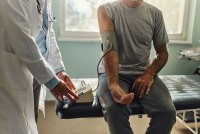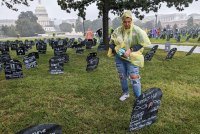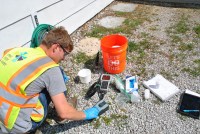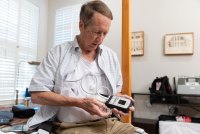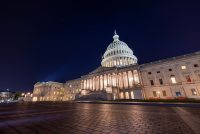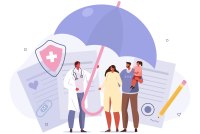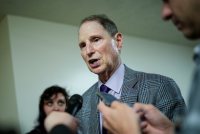Latest Morning Briefing Stories
Mental Health Courts Can Struggle to Fulfill Decades-Old Promise
Mental health courts have been touted as a means to help reduce the flow of people with mental illness into jails and prisons. But the specialized diversion programs can struggle to live up to that promise, and some say they’re a bad investment.
An Arm and a Leg: When Hospitals Sue Patients (Part 2)
Why do hospitals sue patients who can’t afford to pay their medical bills? On this episode of “An Arm and a Leg,” host Dan Weissmann investigates such lawsuits and covers new laws and regulations that may change this practice.
RFK Jr.’s Campaign of Conspiracy Theories Is PolitiFact’s 2023 Lie of the Year
Debate and speculation are heating up over whether Robert F. Kennedy Jr.’s presidential campaign will factor into the outcome of the 2024 election. But one thing is clear: Kennedy’s political following is built on a movement that seeks to legitimize conspiracy theories.
In Year 6, KFF Health News-NPR’s ‘Bill of the Month’ Helps Patients in a Changing System
In the sixth year of the KFF Health News-NPR “Bill of the Month” series, patients shared more than 750 tales of medical billing problems, and reporters analyzed more than $730,000 in charges — including more than $215,000 owed by 12 patients and their families.
Bold Changes Are in Store for Medi-Cal in 2024, but Will Patients Benefit?
California’s Medicaid program is undergoing major changes that could improve health care for residents with low incomes. But they are happening at the same time as several other initiatives that could compete for staff attention and confuse enrollees.
‘AGGA’ Inventor Testifies His Dental Device Was Not Meant for TMJ or Sleep Apnea
The FDA and Department of Justice are investigating the Anterior Growth Guidance Appliance, or “AGGA.” TMJ and sleep apnea patients have filed lawsuits alleging the device harmed them. Its inventor now says the AGGA was never meant for these ailments.
What the Health? From KFF Health News: 2023 Is a Wrap
2023 was another busy year in health care. As the covid-19 pandemic waned, policymakers looked anew at long-standing obstacles to obtaining and paying for care in the nation’s health care system. Meanwhile, abortion has continued to be an issue in much of the nation, as states respond to the Supreme Court’s 2022 decision overturning the constitutional right to the procedure. This week, Rachel Cohrs of Stat, Sandhya Raman of CQ Roll Call, and Joanne Kenen of Johns Hopkins University and Politico Magazine join KFF Health News chief Washington correspondent Julie Rovner to discuss these issues and wrap up the year in health. Also this week, Rovner interviews KFF Health News’ Jordan Rau about his joint KFF Health News-New York Times series “Dying Broke.”
The Year in Opioid Settlements: 5 Things You Need to Know
In the past year, opioid settlement money has gone from an emerging funding stream for which people had lofty but uncertain aspirations to a coveted pot of billions being invested in remediation efforts. Here are some important and evolving factors to watch going forward.
Inside the Pentagon’s Painfully Slow Effort to Clean Up Decades of PFAS Contamination
Cost estimates balloon and complications mount as the Defense Department grapples with PFAS pollution at hundreds of its bases and surrounding communities.
Deep Flaws in FDA Oversight of Medical Devices, and Patient Harm, Exposed in Lawsuits and Records
Thousands of medical devices are sold, and even implanted, with no safety tests.
A New Test Could Save Arthritis Patients Time, Money, and Pain. But Will It Be Used?
Stories of chronic pain, drug-hopping, and insurance meddling are all too common among patients with rheumatoid arthritis. Precision medicine offers new hope.
‘I Am Just Waiting to Die’: Social Security Clawbacks Drive Some Into Homelessness
The Social Security Administration is reclaiming billions of dollars in alleged overpayments from some of the nation’s poorest and most vulnerable, leaving some people homeless or struggling to stay in housing, beneficiaries and advocates say.
When a Quick Telehealth Visit Yields Multiple Surprises Beyond a Big Bill
For the patient, it was a quick and inexpensive virtual appointment. Why it cost 10 times what she expected became a mystery.
Patients Facing Death Are Opting for a Lifesaving Heart Device — But at What Risk?
The HeartMate 3 is considered the safest mechanical heart pump of its kind, but a federal database contains more than 4,500 reports in which the medical device may have caused or contributed to a patient’s death.
New Doula Benefit ‘Life-Changing’ for California Mom
Doulas, independent workers who act as advocates for birthing parents, have been shown to help prevent pregnancy complications and improve the health of both mothers and babies. California’s Medicaid program started covering their services this year, but some doulas say bureaucratic obstacles and inadequate pay prevent their effective use.
Social Security Chief Apologizes to Congress for Misleading Testimony on Overpayments
Acting Commissioner Kilolo Kijakazi sent the letter days after KFF Health News and Cox Media Group reported that the agency has been demanding money back from more than twice as many people as she’d disclosed in October testimony.
‘They See a Cash Cow’: Corporations Could Consume $50 Billion of Opioid Settlements
As opioid settlement dollars land in government coffers, a swarm of businesses are positioning themselves to profit from the windfall. But will their potential gains come at the expense of the settlements’ intended purpose — to remediate the effects of the opioid epidemic?
In New Year, All Immigrants in California May Qualify for Medicaid Regardless of Legal Status
In the new year, California’s Medicaid program will open to otherwise eligible immigrants ages 26 to 49 without legal residency. They will join children, young adults, and adults over 50 enrolled in Medi-Cal through previous expansions to residents lacking authorization. The change is expected to add over 700,000 first-time enrollees.
‘Financial Ruin Is Baked Into the System’: Readers on the Costs of Long-Term Care
Thousands of people shared their experiences and related to the financial drain on families portrayed in the “Dying Broke” series, a joint project by KFF Health News and The New York Times that examined the costs of long-term care.
‘Until It Is Fixed’: Congress Ramps Up Action on Social Security Clawbacks
Sen. Ron Wyden (D-Ore.), chair of the Senate Finance Committee, vowed to meet monthly with Social Security officials until the problems surrounding overpayment demands are fixed.







